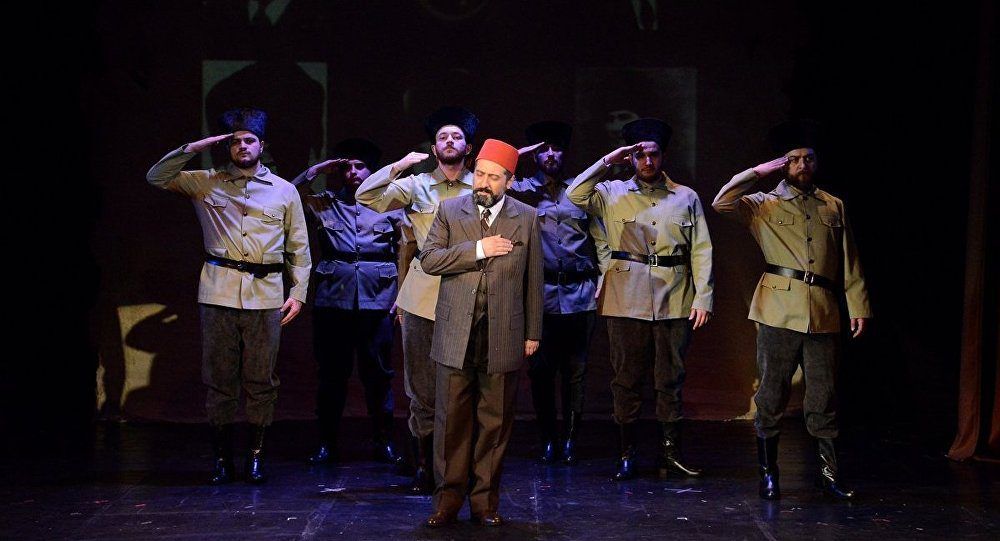
In Turkey’s performing arts, the President takes centre stage
The final curtain has not fallen on Turkey’s state opera and ballet company or its national theatre but these venerable institutions face an uncertain future.
Turkey’s state-run theaters (DT) along with the public opera and ballet company (DOB) had Mark Twain moments the other day when they were forced to declare the rumors of their death to be much exaggerated. “News reports alleging the closure of State Opera and Ballet and State Theatres are unfounded and false,” the DOB’s website said. A statement posted on the DT’s home page was equally indignant.
But to say they these two venerable institutions are in rude good health is also an exaggeration. They are both victims of the country’s transformation from a prime ministerial to presidential system. New laws came into place, which means that all their management and funding once regulated through their own bylaws or by the cabinet will now be made through the office of the president.
This is no mere technicality – this is the same president who once famously asked, “Why would a state-run a theatre?”
Indeed, his ruling Justice and Development Party (AKP) has been waging a war with arts and culture in general, and with state-run art institutions in particular – these being the ones closest to hand. Some date this attrition to the infamous Gezi Park protests of 2013, after which the government began to identify a liberal-minded arts community as the enemy. But there were signs of intolerance even earlier.
Purges, censorship, and self-censorship
In 2012, when Tayyip Erdoğan was still the country’s prime minister, he congratulated the then mayor of Istanbul, Kadir Topbaş, for the amendment the metropolitan municipality had introduced to the bylaw of the Municipal Theatre (ŞT). At the same time, Erdoğan publicly declared his intention to privatize the State Theatres. As a result of the 2012 amendment, the head of the Municipal Theatre is no longer the company’s artistic director, but a manager appointed by the city. This way, the city becomes the sole decision-maker in almost anything concerning the Municipal Theatre — from the company’s repertoire to the actors to be employed.
It was at the time of these developments when a draft bill concerning the establishment of the so-called “Turkish Art Council” (TÜSAK), designed with the intention to centralize the management of all state-run art institutions, followed. Art circles, and art lovers alike, concerned that TÜSAK, whose entire 11-seat board would be appointed by the Council of Ministers, might act on instruction from the government in putting together repertoires and programmes, rallied against the draft bill.
This was followed by a purge of many actors employed by state-run art institutions and the Municipal Theatre. Dismissals continued even after the government declared a state of emergency in the aftermath of the failed 2016 coup attempt.
The fear and repression that came with interventions in repertoires, the resignations, reappointments all combined with the infights among those whose jobs were now threatened, paved the way for censorship and self-censorship.
The new “Law on State Theatre Personnel” and the “Law on State Opera and Ballet Personnel” are part of this same trend. The president’s office will now call the shots.
The performing arts companies themselves are putting a more optimistic spin on events. Both institutions said in their respective statements, in a nutshell, that under the new government system they would continue to operate as before. They were simply in a period of transition during which their status would be governed by presidential decree. “These distinguished institutions will continue with their scheduled activities with the same motivation, enthusiasm, and success as ever,” the websites said, defying those who thought they might be protesting too much.
Fare thee well, autonomy
Indeed, the decree setting out their status was not long in coming. Both DT and DOB have been made into two general directorates with specially allocated budgets under Turkey’s Ministry of Culture and Tourism.
And while this may seem to be a way of stripping these organizations of autonomy, that autonomy may never truly existed in the first place, according to Sedef Erken, an attorney specializing in the legal aspect of arts and culture. And while the administrative structure of Turkey’s new arts policy may become clearer, who will take the key decisions, how and why remains opaque. She explains:
Erken also cautions that the new governing structure will be at the expense of Turkey’s cultural diversity. “Since laws regulating these institutions will not have to be enacted by the Parliament anymore, they will not be subject to review by various worldviews represented in the Parliament,” she says.
Yücel Erten, an awarded theatre director and himself a former head of the DT, is also pessimistic. He warns that these changes open the way if not to direct political interference, then at least to a lack of accountability. “The changes that have been introduced are more than enough to enable interventions in these state-run art institutions’ repertoires, artistic preferences, personnel and budgets,” Erten says. He stresses that anyone can now be appointed general director to art institutions run by the state if considered in line with the government, a criteria that quite differs from a merit-based approach. Art will hardly thrive under these circumstances, Erten says.
The unvoiced fear of Turkey’s art communities is that from now on, the staple diet of its theatres will be a series of one-man shows.
Photo: State-run theaters have been placed under presidential rule.























